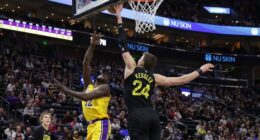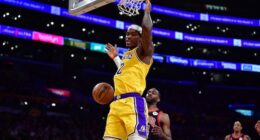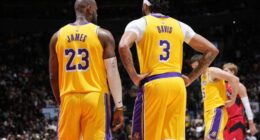Kareem Abdul-Jabbar was born Ferdinand Lewis Alcindor Jr. on April 16, 1947, in New York, New York. By the time he was 9 years old, Abdul-Jabbar had already grown to 5’8 and by eighth grade he stood at 6’8 and could dunk a basketball.
Alcindor attended Power Memorial Academy in New York City, leading the high school to three straight New York City Catholic Championships. He was a First Team Parade All-American all three seasons as well as Mr. Basketball USA in 1964 and 1965.
Alcindor went 79-2 during that time including a 71-game win streak and back-to-back National championships in his 10th and 11th grade seasons and a runner-up finish as a senior.
COLLEGE CAREER
Alcindor would attend UCLA under famed head coach John Wooden, where he would have arguably the greatest college basketball career in history. In his first game on the varsity team, he scored a school-record 56 points, and things continued from there.
From 1967-69 the Bruins went 88-2 which included a 47-game winning streak. UCLA won the championship in all three seasons, with Alcindor being named Final Four Most Outstanding Player each time.
He was also a consensus First Team All-American all three years. Alcindor was also named AP (1967, 1969), USBWA (1967, 1968), and Sporting News (1967, 1969) National Player of the Year two times each, while also winning the inaugural Naismith College Player of the Year Award in 1969.
Following his first season with the Bruins, the NCAA banned the slam dunk primarily due to Alcindor’s dominance with the shot. The rule was not rescinded until 1976.
In his UCLA career, Alcindor averaged 26.6 points and 15.5 rebounds. It was also during his time in college that he converted to Sunni Islam, though he did not publicly begin using the name Kareem Abdul-Jabbar until 1971.
EARLY NBA CAREER
Alcindor was selected No. 1 overall in the 1969 NBA Draft by the Milwaukee Bucks as well as the ABA Draft by the New York Nets. Alcindor told both teams he would only accept one offer from each, and chose the Bucks after the Nets bid too low.
He spent the first six seasons of his career in Milwaukee immediately establishing himself as one of the best players in the NBA. He averaged 30.4 points, 15.3 rebounds, and 4.3 assists during that time, racking up a number of accomplishments.
During his time in Milwaukee he was a 3x Regular Season MVP as well a 4x First Team All-NBA selection. He was also a 6x All-Star, 2x All-Defensive First Team selection, 2x scoring champion, 1970 Rookie of the Year, and 1975 blocks leader.
The Bucks improved from 27 to 56 wins in his first season and in 1971 they would acquire Oscar Robertson. The duo of Alcindor and Robertson led the Bucks to a then-record 66 wins and the 1971 NBA Championship, sweeping the Baltimore Bullets in the Finals. Alcindor was named NBA Finals MVP after averaging 27.0 points and 18.5 rebounds in the series.
LAKERS CAREER
In 1975 the Los Angeles Lakers acquired Abdul-Jabbar and Walt Wesley in exchange for Elmore Smith, Brian Winters, Junior Bridgeman and Dave Meyers. Abdul-Jabbar had requested a trade the season prior, wanting to play in a city that fit his cultural needs.
Abdul-Jabbar was exactly what the Lakers needed after the retirements of Wilt Chamberlain and Jerry West in recent seasons. His first season in Los Angeles was another dominant one as he won his fourth MVP Award after leading the NBA in rebounds, blocks and minutes. He averaged 27.7 points, 16.9 rebounds, 5.0 assists, and 4.1 blocks, and his 1,111 defensive rebounds remains a single-season record.
However, the trade was not enough to get the Lakers back to the playoffs as they finished 40-42.
In 1977 Abdul-Jabbar won his fifth MVP after averaging 26.2 points, 13.3 rebounds, 3.9 assists and 3.2 blocks. He was named to his sixth All-NBA First Team and returned the Lakers to the playoffs after two straight seasons missing out.
Abdul-Jabbar was dominant in the playoffs, averaging 34.6 points, 17.7 rebounds, 4.1 assists and 3.7 blocks, but the Lakers were swept in the Western Conference Finals by the eventual champion Portland Trail Blazers.
In 1978, Abdul-Jabbar’s numbers began to drop slightly. He was down to 25.8 points, 12.9 rebounds, and 3.0 blocks, though he still made All-NBA Second Team. The Lakers, however, were eliminated by the Seattle SuperSonics in the first round of the playoffs.
With teammates Norm Nixon, Adrian Dantley and Jamaal Wilkes all improving and growing more comfortable in their roles, the Lakers were a better overall team, though Abdul-Jabbar’s scoring numbers dropped again.
He averaged just 23.8 points but remained an excellent overall player with 12.8 rebounds, a career-high 5.4 assists and 4.0 blocks. Abdul-Jabbar led the NBA in blocks, being named to 3rd All-Defensive First Team and a second straight All-NBA Second Team.
The Lakers returned to the playoffs, but again fell to the SuperSonics, this time in the second round.
Things would change forever as the Lakers went on to select point guard Magic Johnson in the 1979 NBA Draft, forever changing the fortunes of Abdul-Jabbar and the entire franchise.
Abdul-Jabbar would post averages of 24.8 points, 10.8 rebounds, 4.5 assists and a league-high 3.4 blocks. He was named NBA MVP for the sixth time in his career while also being named All-NBA First Team for the seventh time and All-Defensive First Team for the fourth time.
The Lakers won 60 games and return to the NBA Finals for the first time since 1973. They faced the Philadelphia 76ers in the 1980 NBA Finals, and Abdul-Jabbar was unstoppable. He averaged 33.4 points, 13.6 rebounds and 4.6 blocks, carrying the Lakers in the first five games.
In that Game 5, with the series tied 2-2, Abdul-Jabbar severely sprained his ankle in the third quarter. After going to the locker room, he would eventually limp back out on the court, scoring 14 points in the fourth quarter including a go-ahead dunk with 33 seconds remaining. He finished the game with 40 points, 15 rebounds and 4 blocks in the Lakers’ 108-103 win.
Because of the injury, Abdul-Jabbar sat Game 6, and Johnson would famously lead the team to victory, bringing the Lakers their second championship in Los Angeles.
In 1981, Abdul-Jabbar continued to play at a consistent high level with averages of 26.2 points, 10.3 rebounds and 2.9 blocks. He was named to his eight All-NBA First Team and his fifth All-Defensive First Team, but the Lakers were upset by the Houston Rockets in the first round of the playoffs.
By 1982 Abdul-Jabbar was no longer the dominant force he once was, but remained consistently good thanks to his skill level and overall fitness. He averaged 23.9 points and 8.7 rebounds, but with Johnson and Wilkes coming into their own, the Lakers remained a top team and returned to the NBA Finals.
The Lakers would defeat the 76ers in six games, giving Kareem his third NBA title.
Despite beginning to slow down, the Lakers continued to run their offense through Abdul-Jabbar as he led them in scoring at 21.8 points per game, though his rebounds dipped to just 7.8. Regardless, the Lakers had a very deep team with Magic, Wilkes, Nixon, Bob McAdoo, and a rookie James Worthy.
On March 5, 1984, Abdul-Jabbar surpassed fellow Lakers legend Wilt Chamberlain to become the NBA’s all-time leading scorer, doing so with his signature skyhook.
The Lakers would win 54 games and blow through the Western Conference, setting up a Finals rematch with the 76ers. This time however, the Sixers were on a mission and swept the Lakers. Abdul-Jabbar averaged 23.5 points and 7.5 rebounds, but was outplayed by Finals MVP Moses Malone.
The 1984 season was more of the same as Abdul-Jabbar led a deep Lakers team in scoring at 21.5 points per game. He was selected to the All-NBA First Team for the ninth time and made his final All-Defensive Team appearance as well, being named to the second team, as the Lakers returned to the NBA Finals for the third straight year.
Abdul-Jabbar put up an outstanding performance, averaging 26.6 points, 8.1 rebounds, 4.4 assists and 2.1 blocks, but the Lakers were defeated in seven games by the Boston Celtics.
After two consecutive NBA Finals losses, the 1985 Lakers were on a mission. Head coach Pat Riley completely put the team in the hands of Johnson, fully embracing the fast-break ‘Showtime’ style, but Abdul-Jabbar remained the centerpiece of the halfcourt offense.
He led the Lakers with 22.0 points, 7.9 rebounds and 2.1 blocks, and the team won 62 games on their way to their fourth straight NBA Finals appearance and a rematch against the Celtics.
The Lakers were blown out 148-114 in Game 1 in what was known as the Memorial Day Massacre. Following a 12-point performance, many wondered if Abdul-Jabbar was too old and should consider retiring, but he would shut that talk down.
The savvy veteran dominated the rest of the way including a 30-point, 17-rebound, 8-assist performance in Game 2. That was followed by 26 points, 14 rebounds and 7 assists in Game 3; and 36 points in Game 5.
The Lakers defeated the Celtics in six games as Abdul-Jabbar was named NBA Finals MVP for the second time in his career. He became the oldest player in NBA history to win Finals MVP, and the 14-year gap between his two trophies is also the longest ever.
In 1986 Abdul-Jabbar would actually increase his scoring to 23.4 points per game, but his rebounds dropped to just 6.1. He did still add 3.5 assists and 1.6 blocks and was named to his 10th and final All-NBA First Team. The Lakers again won 62 games, but were shocked in the Western Conference Finals by the Houston Rockets.
By 1987 Kareem was no longer the centerpiece of the offense, averaging just 17.5 points per game, third on the Lakers, though he still played a vital role, especially in the half court and with his rim protection. The Lakers continued to dominate, winning 62 games again and returning to the NBA Finals for one last showdown with the Celtics.
This series is most famous for Johnson’s Baby Sky Hook in Game 4, but Abdul-Jabbar again stepped his game up on the biggest stage, and the Lakers would defeat the Celtics in six games. Kareem averaged 21.7 points, 7.3 rebounds, and 2.5 blocks to help bring home his fifth NBA championship.
In 1988 Kareem played less than 30 minutes per game for the first time in his career. He averaged just 14.6 points, but the Lakers still relied on him numerous times throughout the season, including in the NBA Finals.
With the Lakers trailing 3-2 in the series to the Detroit Pistons and down late in Game 6, L.A. turned to Abdul-Jabbar who was fouled with under 30 seconds remaining. He knocked down a pair of free throws to give the Lakers a one-point win and extend the series to a seventh game which they would win, giving Kareem his sixth and final title.
The 1989 season was the last for Abdul-Jabbar, and teams around the league would pay their respects as he got a retirement tour. He averaged just 10.1 points per game and shot under 50% from the field for the first time in his career, but it didn’t matter in the big picture.
The Lakers tried to send Kareem out on top with one last championship, but injuries decimated them in the playoffs as they were swept in the NBA Finals by the Pistons.
RETIREMENT
Kareem Abdul-Jabbar retired as arguably the most accomplished basketball player ever. He is a six-time NBA champion with two NBA Finals MVPs and six regular season MVPs. He also is a 19-time All-Star, 10-time All-NBA First Team selection, and five-time All-Defensive First Team selection.
Abdul-Jabbar additionally was a two-time scoring champion, four-time blocks leader, and won the rebounding title in 1976. He remains the NBA all-time leader in points, field goals made, and minutes played. He also ranks fourth all-time in rebounds, third in blocks, and second in games played.
The Lakers honored Kareem by raising his jersey into the rafters on March 20, 1990. He would also be immortalized with a bronze statue outside of Staples Center on Nov. 16, 2012.



